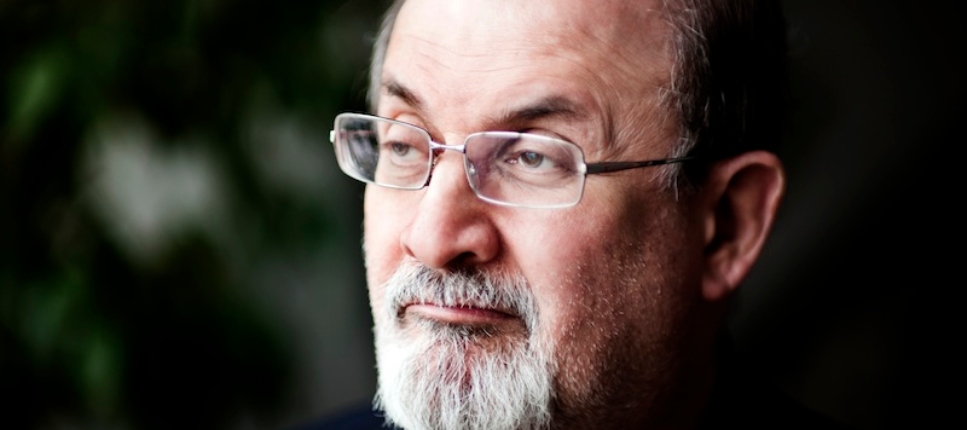TODAY: In 1947, Salman Rushdie is born.
- Benjamin Hedin considers The Lives of Girls and Women, the genre-curious book that “tells us how Alice Munro became Alice Munro.” | Lit Hub Criticism
- How Edgar Allan Poe’s 1844 balloon hoax launched a “powerful if chaotic machine of publicity, doubt, and belief.” | Lit Hub History
- Neal Allen (or Mr. Anne Lamott) reflects on envy, self-publishing, and the perks of being the second-most famous writer in your marriage. | Lit Hub
- Laura Raicovich considers Nan Goldin’s protest against the Sacklers, the myth of neutrality in our cultural spaces, and what accountability means for museums. | Lit Hub Politics
- Acclaimed journalist and longtime New Yorker contributor Janet Malcolm has died at 87. | The Hub
- David Klion on George Packer, Haley Mlotek on Joan Didion, Kerri Greenidge on Clint Smith, and more of the Reviews You Need to Read This Week. | Book Marks
- The CrimeReads editors select their favorite thrillers, mysteries, and crime novels of the year (so far). | CrimeReads
- “I thank you for being educated.” Read Kurt Vonnegut’s words for the class of 1994. | Lapham’s Quarterly
- “Ellison believed the field of culture was a place of limitless freedom, where the artist, writer, poet and musician could express the fullness and complexity of Black life.” Nicole Rudick looks at the influence of Invisible Man on visual artists, 70 years on. | T Magazine
- “A new Federal Writers’ Project could employ creatives and harness their energy to build civic dialogue.” On the possibilities of investing in arts infrastructure. | The New Republic
- Why Amanda Montell wants people to consider “that to some degree, we’re all under cultish influence.” | BookPage
- Sean Illing asks Jarvis R. Givens of Harvard University about the most effective ways to teach the history of American racism. | Vox
- “We need to be seen or else we feel transparent, even nonexistent.” Elisa Gabbert on a year without strangers. | Harper’s
- “I wonder: what, now, in the Anthropocene, is the point of reading?” Daegan Miller reads The Porch and considers the possibilities of nature writing. | Guernica
- Please… my field of Dante studies… she’s very sick. Or: the problems with—and solution to—the current state of Dante studies. | Public Books
- “I feel like I’m an unusually wordy cartoonist.” Alison Bechdel talks to Kristen Radke. | The Believer
- What’s behind artists’ and writers’ fascination with soap bubbles? | JSTOR Daily
- Lydia Lunch on not wasting your talents or material, owning your output, and focusing on what obsesses you. | The Creative Independent
- “Archivists are always racing the clock and crossing their fingers.” On the precious, precarious work of preserving queer histories in the Pacific Northwest. | Atlas Obscura
- Here’s how Los Angeles’ indie bookstores have been surviving the pandemic. | Los Angeles Times
- So, uh… did Proust really have a fetish for abusing caged rats? | The New Yorker
Also on Lit Hub:
Sinead O’Connor remembers her early days in London • Lavie Tidhar considers the unsung history of Jewish writers who pioneered science fiction • Kari Nixon considers the xenophobic legacy of The Hot Zone • How Henry Alsberg went from rock bottom to directing “the most ambitious literary project ever attempted”—the Federal Writers Project • Rivka Galchen recommends reading as a remedy for writer’s block • Akwaeke Emezi on growing up in Aba • Why we’re susceptible to the toxic allure of cults • Laura Lindstedt wonders if the rise of audiobooks might change how authors write books • Amelia Abraham considers Susan Sontag, coming out, and the joys of extravagance
• Ruby McConnell asks what the eruption of Mt. St. Helens can teach us about real-time disasters • Brittany Ackerman considers how much genre can hold • Jonathan Lee on the man who built New York City • On Martha Gellhorn’s love letters to Ernest Hemingway • Shya Scanlon on our love-hate relationship with ‘Internet Literature’ • Sir Roderick Floud on the abundant history of Britain’s gardens • Elyssa Friedland on what to do when your student’s a better writer than you are • Matthew Norman’s most embarrassing literary encounters (so far) • Krys Malcolm Belc on gender, parenthood, and loving through providing • Dariel Suarez on writing fiction as a non-native English speaker • Tips from Robert McKee for creating convincing characters • Christine Platt considers the toxic cycle of bargain shopping and emotionally driven shopping sprees.
The Best of Book Marks:
Sula, The Awakening, The Snowy Day, and more rapid-fire book recs from Raven Leilani • “We had fed the heart on fantasies / The heart’s grown brutal from the fare”: a 1928 review of W. B. Yeats’ The Tower • True Grit, The Fire Next Time, The Velveteen Rabbit, and more rapid-fire book recs from Aimee Bender • Jonathan Lee’s The Great Mistake, Kai Bird’s The Outlier, and Nathan Harris’ The Sweetness of Water all feature among the Best Reviewed Books of the Week
More from CrimeReads:
P.J. Vernon on bad gays in good books and “the affirming power of queer genre fiction” • Christine Mangan on Gothic Venice and the power of setting • Laurie R. King on Emily Gerard, the travel writer who gave Bram Stoker the term “Nosferatu” • Nick Kolakowski on The Limey, Stephen Soderbergh’s subversion of classic noir • Olivia Rutigliano with summertime crime films set in cities • Noel Obiora on Black Lives Matter, 1990s Los Angeles, and the weight of history • Jonathan Lee on the man who built New York City, only to disappear into it • Chris Offutt explains why, in writing about Appalachia, he’s always felt like a crime novelist • Christine Mangan on the power of setting and the strange allure of off-season Venice
